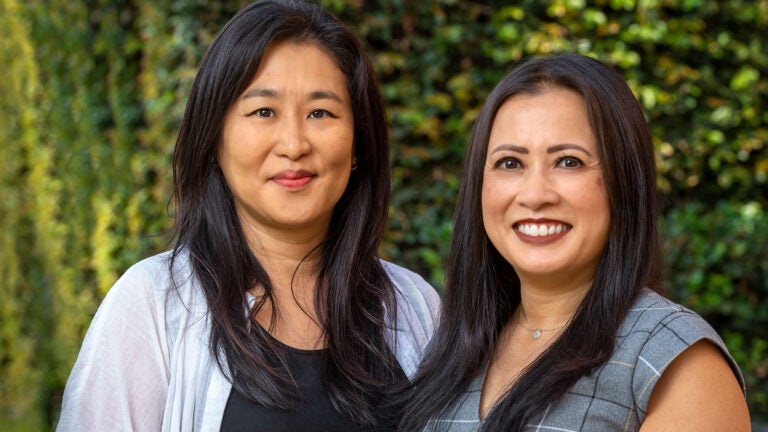
Grace Ryu, left, and Linda Truong brought faculty and staff together to form the Asian Pacific Islander Faculty and Staff Association. (USC Photo/Gus Ruelas)
New group seeks to build community among Asian faculty and staff
The Asian Pacific Islander Faculty and Staff Association, or APIFSA, offers a space where USC faculty and staff can come together to address common concerns.
To Grace Ryu, the pain was like “suffering in a silo.”
That’s how the associate director of the East Asian Studies Center at the USC Dornsife College of Letters, Arts and Sciences describes the days following a mass shooting in Atlanta in March that targeted Asian women. The attack came a year into a pandemic that has been used to fuel anti-Asian hate.
Ryu wanted to do something, anything, about the shooting. She wanted a community where she could process anxiety, fight hatred and give others a safe place to find solace together.
She knew that dozens — if not hundreds — of Asian and Asian American faculty and staff work at USC, and many might want support. But they had no formal way of coming together.
“We were all angry and sad on our own; not knowing where to go, how to voice this or how to respond,” Ryu said. Although there are student associations like the Asian Pacific American Student Assembly or institutions like Asian Pacific American Student Services, USC had no equivalent organization for faculty and staff.
Thanks to the commitment of staff organizers, though, that has changed. USC employees and educators now can come together through the new Asian Pacific Islander Faculty and Staff Association, or APIFSA.
APIFSA traces its origins to Ryu and Linda Truong, managing director of USC Libraries’ information technology group. Truong had heard from a former colleague that staff and faculty at UCLA had recently formed a group for Asian and Asian American employees. That gave her the idea to do the same at USC.
“Why can’t we give ourselves a collective voice and try to create change and awareness about our own community and the issues we struggle with?” Truong wondered.
She texted Ryu, and the two began to organize. Together, they reached out to as many people as they could and scheduled an initial Zoom meeting.
“I think a lot of people were surprised,” Ryu said.
Seeing a screen full of faculty and staff from multiple USC schools and offices confirmed the need for this type of organization, she added. Nearly 90 people attended its first meeting — and since then, the group has grown to 190 members.
USC’s new group for Asian faculty and staff creates ties across the university
The group has organized into six committees that tackle APIFSA’s mission. For example, the curriculum committee provides resources for faculty and administrators looking to diversify curricula. Another committee focuses on mentorship and professional development. And another seeks to build solidarity with other groups like the USC Black Staff & Faculty Caucus and the USC Latino Forum.
In August, the events committee set up a workshop with the Office of Threat Assessment and Management to discuss hate crimes targeting Asian and Asian Americans. Months after the Atlanta shooting, the event helped members feel more supported and empowered.
“To find out this office exists on campus and they were willing to schedule two workshops with APISFA, that is exactly what we want from the university,” Truong said.
The Office of Threat Assessment and Management offers similar workshops to all groups at USC.
Glenn Osaki, USC senior adviser for international communications and marketing, is on the communications committee. This committee built APIFSA’s website and social media channels.
It makes the university richer overall when diverse voices can be heard and can feel a sense of community.
Glenn Osaki
USC staff and faculty on these six committees get a chance to work with colleagues who are not in their departments, enabling them to network and build ties across the university. For example, Osaki works in University Communications and is on the committee with faculty from the USC Annenberg School for Communication and Journalism and staff from the USC Kaufman School of Dance, USC Dornsife and Alumni Relations.
Regardless of their committee, Osaki said, the members all work toward the same goal: to create a safe space where members can connect with like-minded people and have a voice to advocate on their behalf.
“It makes the university richer overall when diverse voices can be heard and can feel a sense of community,” he added. “APIFSA is an employee group that strives to meet our basic need for purpose and belonging.”
Truong and Ryu said USC’s focus on diversity, equity and inclusion initiatives makes this an ideal time to start APIFSA. This group can help lead those efforts and ensure Asian and Asian American communities have a voice in the process.
“We need to have a venue or forum to discuss those interests that our individual departments aren’t talking about,” Truong said. Members can then raise issues to schools with a powerful, collective voice.



